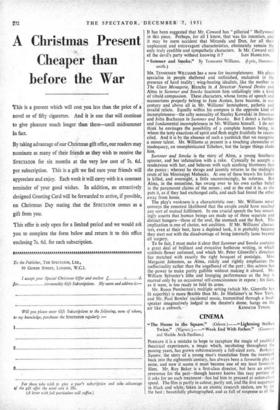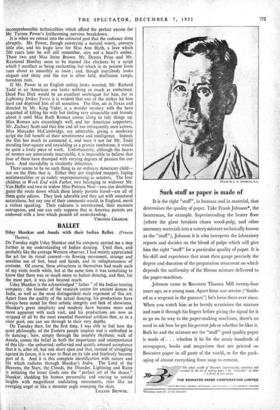CINEMA
"The House in the Square." (Odeon.)— - " Lightning Strikes Twice." (W,a2-ner.)--,4 Week End With Father." (Gaumont and Marble Arch Pavilion.) PERHAPS it is a mistake to hope to recapture the magic of youthful theatrical experiences, a magic which, incubating throughout the passing years, has grown subconsciously a full-sized aura. Berkeley Square, the story of a young man's translation from the twentieth back into the eighteenth century, has always been a favourite play of mine, and now it seems it must become one of my least favourite films. Mr. Roy Baker is a first-class director, but here an undue reverence for the past—though heaven knows this racy portion of it asks for no such treatment—has led him to proceed at sedan-chair speed. The film is partly in colour, partly not, and the first sequences in black and white, taken in an atomic research station, are by far the best ; beautifully photographed, and as full of suspense as of the
incomprehensible technicalities which afford the perfect excuse for Mr. Tyrone Power's forthcoming nervous breakdown.
It is when we retreat into the coloured past that the radiance dims abruptly. Mr. Power, though conveying a natural worry, conveys little else, and his tragic love for Miss Ann Blyth, a love which 200 years later he will still remember, stirs not a heart's ember. These two and Miss Irene Brown, Mr. Dennis Price and Mr. Raymond Huntley seem to be trussed like 'chickens by a script which I recollect as being enchanting but which in its present form runs about as smoothly as rosin ; and, though everybody looks elegant and shiny and the eye is often held, disillusion ramps, boredom riots.
If Mr. Power in an English setting looks worried, Mr. Richard Todd in an American one looks nothing so much as embalmed. Dead Pan Dick would be an excellent soubriquet for him, for in Lightning Strikes Twice it is evident that one of the strikes hit him hard and deprived him of all sensation. The film, set in Texas and directed by Mr. King Vidor, is a murder mystery with the herb acquitted of killing his wife but feeling very unsociable and broody about it until Miss Ruth Roman comes along to tidy things up. Miss Roman acts exceedingly well, and her American supporters, Mr. Zachary Scott and that fine and all too infrequently seen actress, Miss Mercedes McCambridge, are admirable, giving a moderate script the full benefit of their sensitiveness and intelligence. Indeed, the film has much to commend it, and were it not for Mr. Todd standing four-square and unyielding as a granite tombstone, it would be quite Cively piece of work. Unfortunately, although the hearts of women are notoriously inscrutable, it is impossible to believe that four of them have thumped with varying degrees of passion for our hero. And incredulity is virulently infectious.
There seems to be no such thing as an ordinary American child— not on the films that is. Either they are ringleted moppets lisping sentimentalities or as rudely unprepossessing as senators. The four children in Week End with Father, two belonging to widower Mr. Van Heflin and two to widow Miss Patricia Neal—you can doubtless guess the route down which these lonely parents travel—are all of them quite odious. They look adorable and they act with unnatural naturalness, but any one of their comments would, in England, merit a violent spanking. Their rudeness is unrestrained, their manners outrageous, and one can only suppose that in America parents are endowed with a love which passeth all understanding.
VIRGINIA GRAHAM.



















































 Previous page
Previous page